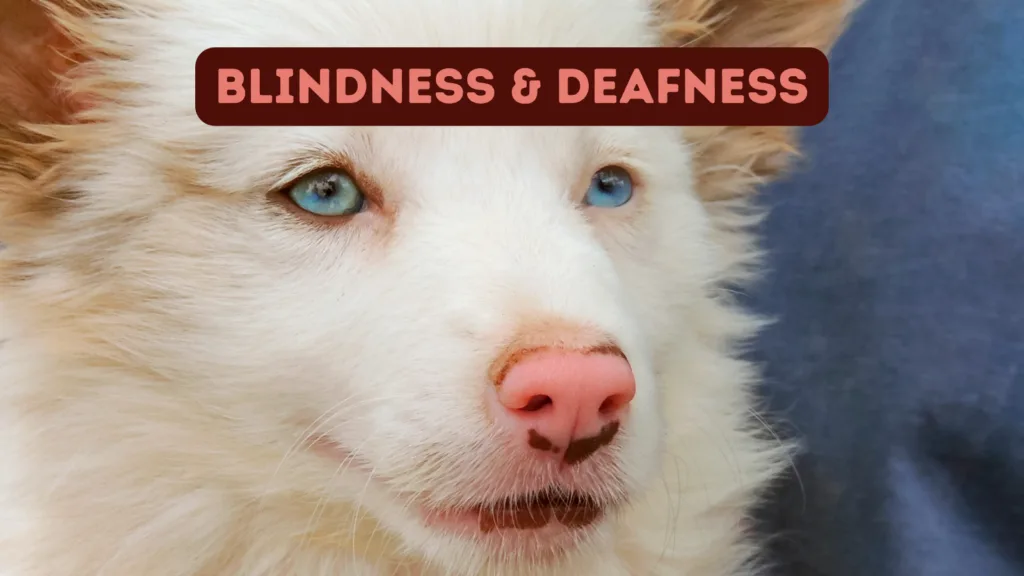Aussiedoodles, the popular crossbreed between the Australian Shepherd and the Poodle, can be at risk of being born blind, deaf or both blind and deaf. Understanding the genetic factors contributing to these conditions can help prospective pet parents make informed decisions.

The Merle Gene
One of the primary genetic factors that can lead to blindness and deafness in Aussiedoodles is the presence of the merle gene, particularly when two merle-coated dogs are bred together.
The merle gene creates a mottled or patchy coat with varying colors and can also affect eye color. While a single merle gene can result in a beautiful coat pattern, breeding two merle dogs (double merle) can lead to severe health issues.
A responsible breeder will have genetically tested both parents prior to breeding to ensure that they both do not have the merle gene.
When an Aussiedoodle inherits the merle gene from both parents (such as when an Aussiedoodle is bred with either another Aussiedoodle or an Australian Shepherd), the resulting genetic combination significantly increases the risk of congenital deafness and blindness.
Double merle Aussiedoodles often have a predominantly white coat, sometimes with patches of light gray, black, or blue merle patterning. The white areas are usually more extensive compared to single merles.
Many double merles have blue eyes, which is common in merle-patterned dogs. However, they can also have heterochromia (two different colored eyes) or even partial heterochromia (multiple colors within a single eye). Some may have eyes that are so light blue they appear pink.
Some double merles may have eyes that are abnormally small, a condition known as microphthalmia, which often accompanies blindness or vision problems.
Double merles are also more likely to be born with malformed inner ear structures, leading to sensory impairments.
Other Genetic Conditions
Aside from the merle gene, other genetic conditions inherited from the Australian Shepherd or Poodle can also contribute to blindness and deafness:
- Progressive Retinal Atrophy (PRA): This genetic condition leads to the gradual degeneration of the retina, causing vision loss and eventual blindness. Both Australian Shepherds and Poodles can carry the gene for PRA, making it a potential risk for Aussiedoodles.
- Cataracts: Both parent breeds are susceptible to cataracts, which can lead to cloudy vision and blindness if left untreated.
- Congenital Deafness: Beyond the merle gene, congenital deafness can occur due to other genetic mutations, though this is less common.
Again, responsible breeders will have genetically tested the parents.
Preventive Measures
Prospective and current Aussiedoodle owners can take several steps to minimize the risk of blindness and deafness in their pets:
- Responsible Breeding: Avoid breeding two merle-coated dogs to prevent the occurrence of double merles. Work with reputable breeders who perform genetic testing to screen for conditions like PRA and other inherited disorders.
- Regular Veterinary Care: Routine check-ups with a veterinarian can help detect early signs of eye or ear problems. Early intervention can prevent or mitigate the progression of certain conditions.
Living with a Blind or Deaf Aussiedoodle
You may see blind or deaf Aussiedoodles looking for a home with rescues for Aussiedoodles or rescues for deaf dogs, and there are many ways to help them lead a full and fulfilling life:
- Training and Adaptation: Train using tactile and visual cues for deaf dogs, and rely on vocal commands and touch for blind dogs. As with all dogs, consistency and patience are key.
- Safety: Modify your home to create a safe environment. Use baby gates to block off stairs, and keep pathways clear to prevent accidents. Scent markers can help your dog identify locations.
- Companionship: Provide plenty of companionship and enrichment activities. Interactive toys, scent games, and social interactions can help stimulate their other senses.
- What’s an Unfurnished Aussiedoodle? - December 14, 2024
- 500+ Aussiedoodle Names - July 29, 2024
- Does Your Breeder Do Puppy Socialization? - July 9, 2024
